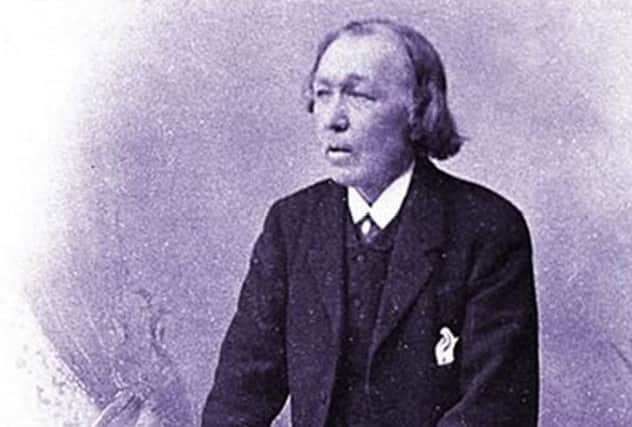Scottish fact of the week: William McGonagall


The author of about 200 poems, McGonagall gained a reputation as a rather poor poet, who appeared to be unmoved by his contemporaries’ opinion of him.
Due to his reputation - indeed, he is often acclaimed as the worst poet in British history - his verse remains popular today.
Advertisement
Hide AdPossibly his most famous poem is his verse commemorating the Tay Railway Bridge accident, which occurred on December 28, 1879.
During a particularly strong storm, the bridge collapsed as a train was crossing, with the loss of all on board.
However, the death toll is thought to have been closer to 75 people, and not 90 as McGonagall suggested in his poem:
‘Beautiful Railway Bridge of the Silv’ry Tay!
Alas! I am very sorry to say
That ninety lives have been taken away
On the last Sabbath day of 1879,
Which will be remember’d for a very long time.’
McGonagall moved with his family from Edinburgh to Paisley, and then Glasgow, before settling in the City of Discovery.
Like his father, he trained as a hand-loom weaver and before his foray into poetry, was interested in acting. However, his only role of note - Macbeth - was tainted by the fact that he paid money to secure the role.
Although the play should have ended with the death of Macbeth, the poet felt that the actor portraying Macduff was trying to upstage him, and McGonagall simply refused to die.
Poetry career
Advertisement
Hide AdDespite being born sometime between 1825 and 1830, it was nearly 1880 before McGonagall turned his hand to writing poetry, at the age of 52, according to his autobiography.
He wrote to Queen Victoria to drum up interest, but his approach was rebuffed by a Royal aide in a return letter.
Advertisement
Hide AdHowever, McGonagall believed his reputation would be boosted by giving a reading in front of the monarch.
And so in July 1878, he walked the 50-odd miles from Dundee to Balmoral to perform for Queen Victoria.
When he arrived at the castle, he announced his arrival by introducing himself as ‘The Queen’s Poet’. However, he was refused entry, and told never to return.
Financial struggles
In 1880 he travelled to London to seek his fortune, but returned having been unsuccessful. Undeterred, he set out for New York seven years later but again returned having had no luck.
He landed on his feet after finding a job reading poetry at a circus - during which the crowd was allowed to throw eggs, flour and stale bread at McGonagall.
He received 15 shillings for each performance, before city bosses put a stop to the performances following concern at the raucousness of the events.
Advertisement
Hide AdWith his lucrative circus gig ended, McGonagall again found himself in financial dire straits, although his friends funded the publication of a collection of his poems in a bid to help the poet make money from his work.
He left Dundee for Perth in the early 1890s.
Hoax letter
One of the more bizarre occurrences in McGonagall’s life took place shortly after he arrived in Perth.
Advertisement
Hide AdHe received a letter purportedly from the King of Burma and the Andaman Islands informing him that he had been knighted as ‘Topaz McGonagall, Grand Knight of the Holy Order of the White Elephant Burmah’.
Despite it being a fairly obvious hoax - it alluded to Chaucer’s doggerel verse ‘The Tale of Sir Topas’ - McGonagall lapped it up, either knowingly or unknowingly, and referred to himself as William Topaz McGonagall, Knight of the White Elephant, Burmah, in his advertising up until his death in 1902.
He moved to Edinburgh in 1895 with his wife but by 1900 the money had dried up and an increasingly frail and sick McGonagall again had to rely on money from his friends to get by.
He died in poverty in 1902, and was buried in a pauper’s grave in Greyfriars Kirkyard. The cause of his death was attributed to ‘cerebral haemorrhage.’
There is a plaque above his place of death in South College Street, reading: “William McGonagall, Poet and Tragedian, Died Here, 29 September 1902.”
Possible Asperger’s?
Dr Norman Watson, who wrote a biography of McGonagall, suggested that the poet may have had Asperger’s Syndrome, or a similar disorder on the autistic spectrum.
Advertisement
Hide AdHis repetition of phrases and apparent struggle with social interaction point towards a possible mental disorder, according to Watson.
He told The Scotsman in September 2010: “McGonagall showed significant difficulty in social interaction - he made people laugh but seemed to remain insensitive as to why.
Advertisement
Hide Ad“The lack of demonstrated empathy is said to be possibly the most dysfunctional aspect of Asperger’s, while not recognising a listener’s feelings or reactions is another form of social awkwardness associated with it.”
McGonagall’s apparent lack of response to insults and being hit with missiles also suggests some sort of disorder, according to Prof Tommy MacKay, visiting professor of autism studies at Strathclyde University, who added: “People who have Asperger’s characterise it by impairments in reciprocal social interactions, so their ability to read the signals is very poor.
“They can come across as being very thick skinned and unable to read between the lines and sometimes even read the lines themselves. In regards to this, McGonagall would fit quite well.”
A number of prominent authors and writers are thought to have been on the spectrum, including George Orwell, James Joyce, Hans Christian Andersen and Lewis Carroll.
Legacy
There is a McGonagall Square in Dundee, while a number of his poems have been inscribed on pavements in the city, and a collection of his poetry is maintained in Dundee Central Library.
In May 2008, a collection of 35 McGonagall poems, signed by the author, fetched more than £6,000 at auction in Edinburgh.